Review for Runaway
Introduction
I’m beginning to feel that my movie collection is a never-ending attempt to hold onto my rapidly receding childhood. Certainly the majority of the films that I buy tend to date from the seventies, eighties and nineties, and they’ll also get the most in the way of re-watches, while more recent films tend to languish on my shelves for much longer between viewings. The thing is that I used to watch some weird, obscure stuff when I was a kid, the kind of movies that would be left on the video rental shelves on a Friday night, after everyone else had rented out all of the blockbusters. Runaway is a case in point, a sci-fi movie written and directed by Michael Crichton, which might have had a TV broadcast or two in the eighties, but certainly never troubled the box-office. But it’s a film that has stuck in my nostalgia ever since, not least because of its cast, but also because of the Terminator-lite storyline. I’ve occasionally scanned the e-tailer shelves for a DVD copy on and off for the last fifteen years, but it has never seen a UK release (apart from that initial VHS rental). But it’s worth looking overseas once in a while to see if the obscure films have had more affection. It turns out that German film fans have the same appreciation for the films of my youth. Not even the US gets it, but Germany has Runaway on Blu-ray. Why would I import the US DVD now? One of these days, someone will give High Risk a genuine release (not the 2nd generation TV broadcast VHS rip that’s flooded the market since it went public domain), and I can die happy.
It’s the near future, and robots are ubiquitous, doing all sorts of work, from the menial and repetitive, to heavy labour, and even care-giving. But having been designed and created by imperfect humans, they also can and do go wrong, while their ubiquity also means that people can be threatened when they malfunction. That brings in issues of insurance and liability, which is why the police are expected to handle it. They’ve set up a ‘Runaway’ unit to deal with these out of control robots, and Sergeant Jack Ramsay is the resident expert on the force. It’s not the cutting edge of police work, as his new partner Karen Thompson observes, and it was actually a fear of heights that took Ramsay out of front line policing.
Then a robot commits murder. This isn’t just a glitch or a slipped gear, a domestic robot deliberately picked up a kitchen knife and attacked its owners, and when Ramsay goes after it, it picks up a gun as well. Someone’s been creating new control chips, and the robot has been altered. These chips are insidious, turning any machine into a weapon, and it’s just the kind of thing that criminals and assassins would pay big money for. The evidence points to an unsavoury man named Luther as the kind of person who would be happy profiting from such technology, but the chips aren’t the only lethal toys that he has to play with.
Picture
Runaway gets a 2.35:1 widescreen 1080p transfer. Back catalogue titles as obscure as Runaway are never going to get the restoration that more populist films get, but it looks really good in high definition. It’s free of significant print damage and dirt, and the film has been transferred without any of the post-production that some old films get to make them HD ready. There’s certainly no problem with DNR or sharpening to my eyes. It’s clear and consistently colourful throughout, with excellent detail. Darker scenes do tend to be somewhat indistinct, lacking in contrast, and well-defined blacks, but generally the film looks fantastic. Some aspects of the anamorphic lensing do show on screen, particularly softer edges to the frame. There is also an ever so slight wobble to the film, really only apparent during the credits. But this is as good as you can hope for from a catalogue title such as Runaway.
Sound
You have the choice between DTS-HD MA 2.0 Stereo German and English with optional German and English subtitles. It’s a solid audio experience with the film, and a little Prologic does wonders in broadening out the film’s ambience, putting you in the middle of the action. The dialogue is clear throughout, and the technological sound design of the film works well. Jerry Goldsmith’s score is something of an odd beast here, as he opts for an electronic score, wholly synthesised, which for one thing sounds somewhat generic, and certainly not up to the standards of people like Vangelis or Christopher Franke, who are much better versed in the medium. The second thing is that it immediately dates the film.
Extras
The disc comes in a thin Blu-ray Amaray case, with a reversible sleeve so that you can dispense with the German ratings logo. It boots straight to an animated menu in German, although the four options are easy to figure out.
The extra features are unsurprisingly weak, and all you get is the German trailer, in 480i widescreen, running to 2:05. The same trailer is available in English, albeit in 480i letterbox running to 2:07, and more VHS quality. Finally there is an image gallery slideshow running to 2:30, with poster art and promotional stills for the film.
Conclusion
It’s always a pleasant surprise when a childhood favourite film stands the test of time, and it’s even more gratifying when it seems to have gotten better with age. Runaway is such a film, and I had a great time rediscovering it last night. A lot of that is down to the cast, although at the time I was probably disappointed with Tom Selleck not recreating his Magnum persona, and instead delivering a more nuanced and layered character. I have to admit that the film is still stolen by Gene Simmons who was born to play a villain, and in Luther he makes for a memorable screen villain indeed. It helps when you naturally look evil, but he makes the most of it, and makes you jump out of your skin more than once.
Runaway is an entertaining tech thriller, although in some ways it’s a by the numbers police procedural, the kind of movie that would be lampooned by Last Action Hero. The thing is that it’s pretty realistically handled, which given Hollywood’s propensity to completely lose the plot, when it comes to things computer related is a pleasant surprise. There aren’t too many moments in the film that shatter the suspension of disbelief, the robots only turn lethal after they’ve been reprogrammed to, they don’t do anything too far outside the bounds of realism, and the technological tricks that the villain uses to commit his crimes all pretty much stand up under scrutiny. You can forgive the guided heat seeking bullets (they’d probably run out of fuel after ten metres), as they just look so cool.
But it is that by the book police thriller. Ramsay’s the ace tech cop in the precinct, but his weakness is that he’s afraid of heights, and there’s an emotional back-story as to why he quit frontline policing which will have to be addressed by the end of the movie. Karen Thompson wears two pairs of shoes in this film, potential love interest as well as the new partner that always shows up in these films. Marvin is the bookish cop back at the police station who does all the research and science stuff, but leaves all the action stuff to Ramsay. There’s also the shouty police captain (played by Police Academy’s G.W. Bailey) for Ramsay to butt heads with regarding procedure, although he foregoes the speech about having the Commissioner on his ass because of Ramsay’s disregard for the regs. And the villain, Luther, a mercenary chap who’s in it just for the money regardless of the body-count, makes it personal when Ramsay gets in his way once too often. The surprise is that Ramsay isn’t on the verge of retirement. You often get the feeling that these films can script themselves! However, I doubt I would have been as cognizant of the tropes back when I first saw the film.
There are things that do date Runaway, not least the fashions and the music. The budget tells in the production values, in that they could speculate in certain areas, make certain things futuristic, but the look of the film is otherwise resolutely stuck in the nineteen eighties. But 30-odd years down the line, Runaway succeeds in just how prescient it is about the future, and how realistically it speculates about future technology, although it may not have seemed so at the time. The trick is that the robots are realistic. They aren’t humanoid, intelligent and beyond the bounds of reality, they’re more realistic extrapolations of what was being done in the nineteen-eighties regarding factory automation. The little trundling machines that we see in this film aren’t too far removed from sort of robots that can be bought today. Siri’s conversational level isn’t quite up to the standards of one of the robots in the film, but even still it is shown to be limited by its programming. And the drones flying around in this film, are nigh on identical to the machines that you can buy from Argos. The film also predicts tablet computers, self-driving cars, portable flat screen TVs, biometric IDs, and a version of the Internet, although the brick-sized mobile phone lets the side down.
The bottom line is that I had fun watching Runaway, even more than I did the first time around, and I have to admit that the HD presentation really serves this film well, bringing out the best in its visuals. While the story may seem clichéd now, the technological crutch of runaway robots that lies at the heart of the narrative gives it enough in the way of originality that it’s easy to forgive the clichés. The performances are strong, and there’s a nice relationship between Ramsay and his son Bobby, that isn’t as sugary as the usual father son relationships in these films; there’s more of sense of humour to their interactions. But of course you can’t get away from Gene Simmons as Luther, an awesome screen villain that chills the blood merely with a stare. I am so glad that countries like Germany appreciate films like Runaway and Strange Days enough to give them HD releases, films that tend to slip through the cracks in their native America. I get the feeling I’ll be importing a lot more in the way of Blu-rays from Europe before we finally Brexit!
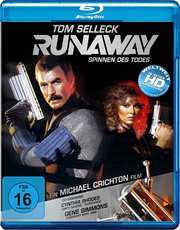








































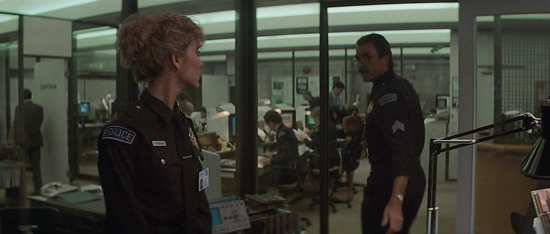
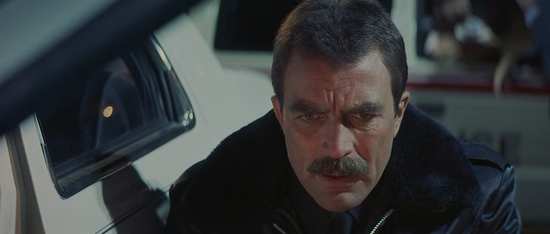
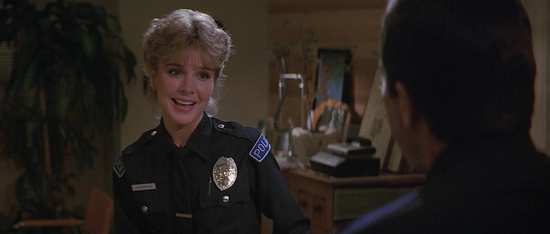
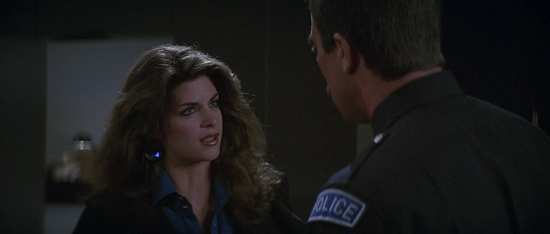
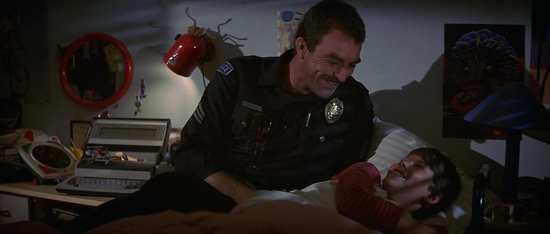
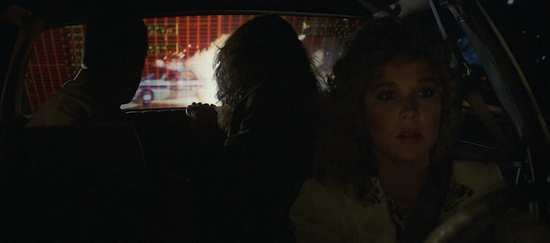
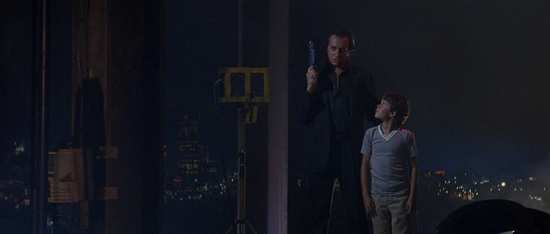
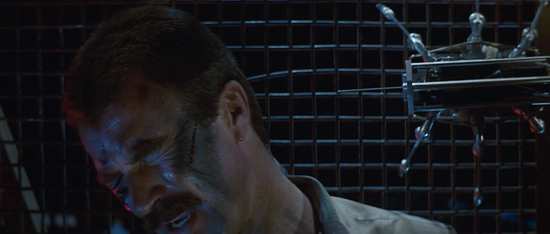
Your Opinions and Comments